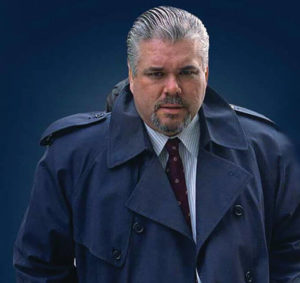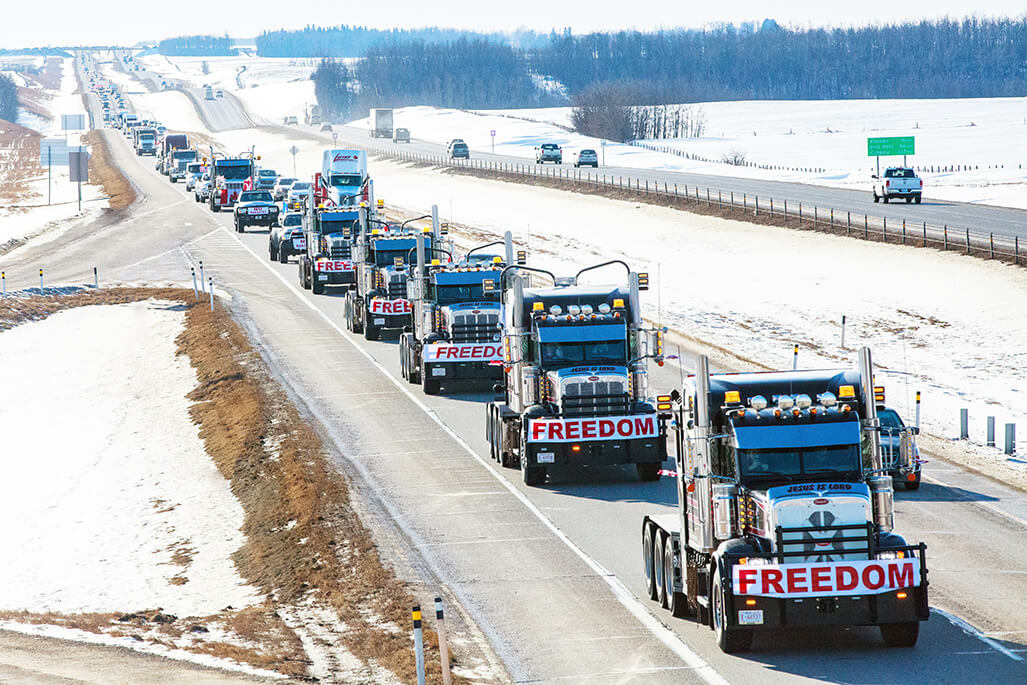“Lack of leadership” – Craig Bromell
In the recent weeks, with the protests of some truckers against the mandatory vaccination rule, Canada has experienced a situation that brought several concerns to the table.
The self-styled Freedom Convoy parked dozens of trucks in front of Parliament in Ottawa, invaded motorways, prevented normal road traffic, blocked cities, stopped many thousands of Canadians from going to their jobs, blocked vehicles from crossing borders that are crucial to Canada’s economy… all this without any sign of a position of force that would stop it, restoring the law and normality. How was it possible to allow a minority that cried out for freedom to attack the freedom of so many Canadian citizens? What about the credibility and image of those whose professional duty it is to uphold the law? Now that the borders are starting to reopen and police action is imposing the demobilization of demonstrators, thanks to the invocation of the Emergency Act, Milénio Stadium tried to find answers to all the questions in the air from Craig Bromell, a former police officer and a former president of the Toronto Police Association. And the lack of leadership seems to be the answer to almost all of them.

Milénio Stadium: How does a former police officer and a former president of the Toronto Police Association feel about everything that has been going on?
Craig Bromell: I think overall, my first impression is lack of leadership on many fronts. It’s important for people to be able to make their voices heard, peacefully, no matter what the issue is – and I think it’s important that we have that in our society, I think it helps a lot. Any demonstrations I’ve been involved with in the past have always been peaceful. It’s a system that works to get your message across if you’re not happy with something. So, when something like this comes up, when I talk about leadership, I think a lot of people were caught off guard. It’s easy to not put blame on because there’s no template to counter something like this—e really have never seen this before. But on the leadership side, this protest started in British Columbia and it took days to get it to Ottawa. I think a lot of people were just sitting around, the decisions makers, and they weren’t planning anything – they literally thought that this would go away after a couple of days. That shows me that the intelligence of law enforcement wasn’t that good. They didn’t gather information. They started gathering intelligence when it was too late. They really got caught with no preparation and no plan. And from what I understand, even now, two weeks later, in Ottawa there’s still no plan in place as to how to remove the protesters. Now the latest announcement, with the Emergency Act, is to remove these people: that’s the outcome. If they’re not removed and if the vehicles are not removed, then it’s a failure.
I think a lack of leadership, on all fronts, has been really bad, atrocious.
MS: The police are responsible for enforcing the law… and blocking borders, for example, is obviously not legal. Why was it necessary to declare a State of Emergency in Ontario to start taking action?
CB: Well, they didn’t. The laws are already there from day one and I think – and after speaking directly with many police officers that were involved in this – there’s a lot of frustration on the front-line because, pretty much, they were ordered to stand down – no confrontation, be nice, almost like a pacifist approach. And that’s not law enforcement. So, I think that’s frustrating for people on both sides of the border and they’re scratching their heads as to why the police were not moving in. Well… They were ordered not to move in. They wanted to really take a passive approach to this, to see if they could talk them out of it and talk to them into moving on… and if that wasn’t going to happen in 48 hours, let alone days later. That’s the leadership side I’m talking about.
There’s a lot of confusion on the front-line between police officers. They don’t know what to do and when that happens is really best to sit back and not do anything, because you are not going to put your job on the line, you’re in a profession where you have to take orders, that’s the police role.
The massive mistake here has to do with the decision-makers and the time they took to make one. Again, this was something we’ve never seen before. But now there’s a bigger picture: how do we prepare for the “next time”? Because right now, what all these people have to do is show up with 20 or 25 transport trucks. This is no longer vaccination issues with truckers, this is more than just vaccination—if you have a demonstration, you want the government to hear your words, just show up with 25 trucks. So, there’s a bigger picture here—how do you stop it from happening again? This is not over yet but I hope they’re thinking about this, because this can easily happen again on another issue. Covid-19 vaccination will eventually be over, probably this summer, so this issue about truckers crossing the border with a vaccine or not will stop being an issue but this is bigger than that. What happened this time was with a small group; this was a group that police could easily organize in a safe way to move on.
MS: Do you feel that the image of the police and the respect due to them may has been affected by this situation?
CB: It’s not about the police officers you see, it’s not the front-line people, not those officers with the yellow vests on, it’s about the leadership of the police, it’s the police service boards. The ones we see on a regular basis are just taking orders. There’s no way around that, this is coming from the different groups of people that give those officers orders. And the order was to stand down.
MS: What message was passed on to society with this whole situation? Can we run the risk of having spread the idea that in Canada one can disrespect the law, the institutions, the governments, and the police itself?
CB: Well on this issue I agree, yes. That message is out there on this issue. But overall, the police are still doing their job. They just did a massive seizure of guns and ammunition in Alberta. That was a very important arrest because I think that showed Canadians that these people are all innocent. The arrest at blockage in Alberta, where they seized all the guns, there was going to be a shoot-out, there was going to be dead bodies. That’s the only reason they have guns like that, so that really opened a lot of Canadians’ eyes.
The pacifist approach to this is very dangerous for law enforcement and for citizens like yourself. It did send the wrong message, we’re the last line of defence. On this issue it made things look really bad, that you can get away with breaking the law, no doubt about it. My biggest concern is, again, the next one. People can just show up a bunch of trucks and they better be ready for it because I don’t think this is the last time. The leadership of law enforcement really was not prepared for this one.
MS: Did they just open the door for something like this to happen again?
CB: Absolutely. There’s no doubt about it. Why wouldn’t they? They know that so far, with a small group, they got away with it. They embarrassed us. It’s almost anarchy, it’s not there, it’s been peaceful, but next time it can turn into anarchy, and we’ve seen that with many riots in Toronto, where anarchists get involved. I’m also concerned about the American side of this, there’s no doubt a lot of people donated money to the cause out there, I’m concerned about that. Their right-wing fanatics are very dangerous. I’m afraid those are the type of people that are trying to infiltrate this, and that’s why you have to end this as soon as possible. Don’t give the momentum. They have to kill their momentum right now, hopefully in a peaceful way. I think talk, dialogue and negotiation are over, there’s no mediation, there’s no third-party that could be brought into this, I think that would be wrong, especially since they declared the State of Emergency, so we are not going to see the mediation side of this. People are going to be forced out. They have to do that.








Redes Sociais - Comentários